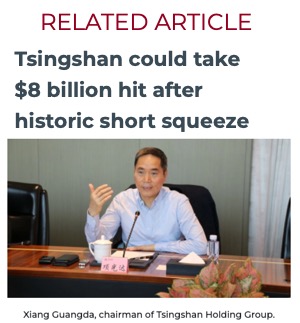Nickel price spike “purely financial” but Tsingshan effect could linger
Time:Thu, 10 Mar 2022 06:25:08 +0800
keywords :
After a chaotic couple of days that saw the price spiking 250% to a high of $101,365 a tonne, nickel trading remains suspended in London. The LME has announced it is unlikely to restart before Friday.
In Shanghai on Tuesday, the nickel price jumped 17%, the maximum allowed in a single trading session, after which the SHFE contract was also suspended.
March SHFE nickel contracts fell as much as 7.2% to 236,000 yuan ($37,352) per tonne while metal for August delivery slumped by the daily limit to 211,500 yuan (33,472) a tonne.
BMO Capital Markets in a note argues that this week’s move is “purely financial” and there are knock on effects from the LME’s market structure that upended trading in in the stainless steel and EV battery ingredient:
“Such volatility forces additional collateral to be posted by short position holders, which for funds may mean selling positions in other commodities while for producers this may strain treasury balances.
“We see limited risk this happens with other metals, which are naturally larger and more liquid than nickel, and with less evidence of extended short positions.”
It was the squeeze on Tsingshan’s massive short position which ballooned to $8 billion on paper that lit the nickel price on fire this week and while the world’s top stainless steel producer appears to have made sufficient arrangement with its banks to cover margin calls, there may be linger effects, BMO notes:
“We would expect the company’s ability to invest in growth may be limited in the near term, potentially hitting supply forecasts.”
Bloomberg reports another headache for Tsingshan as it attempts to exit its position is the fact that the company’s output does not match the grade of nickel used in settlement on the LME, the contracts aren’t a perfect hedge.
Tsingshan, founded by husband and wife team Xiang Guangda and He Xiuqin in the 1980s, pioneered the large-scale use of nickel pig iron in the stainless steel industry.
Tsingshan has been behind some of the metal’s biggest swings in recent years, helping drive prices sharply higher by in 2019 by stockpiling and triggering a brief drop early last year after unveiling a process to turn nickel pig iron into matte (typically around 70% nickel), a form suitable for the EV supply chain.
The Wenzhou-based firm is targeting nickel matte production capacity of 100,000 tonnes per year by October 2022.
BMO forecasts global nickel demand will exceed 3 million tonnes for the first time this year as the EV market continues to grow at a torrid pace.

